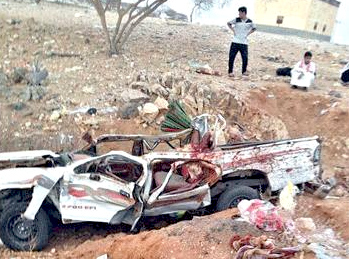 Abha, Jun 20: Nine people died and eight injured in two separate traffic accidents in the southern region on Thursday.
Abha, Jun 20: Nine people died and eight injured in two separate traffic accidents in the southern region on Thursday.
In the first accident, eight people lost their lives and three injured when their vehicle hit a camel in Rijal Al-Mae, Asir region, said security sources.
The early-morning crash took place on Jandalat Wadi Reem, said Ahmed Ibrahim Aseeri, spokesman of the Saudi Red Crescent Authority.
“We sent four ambulances to the accident site soon after hearing about the news and found that the accident occurred after a pickup, carrying 11, crashed into a camel,” Aseeri said. The authority’s operation room received the news of the accident at 3 a.m.
Seven passengers, including the driver, died on the spot, while the eighth died on his way to the hospital. Three passengers, with serious injuries, have been taken to Darb General Hospital for treatment, the spokesman said.
Another accident took place in Baha, killing one and injuring five, said Abdullah Al-Dabyah, spokesman of the Civil Defense in Baha.
“The victim and the injured were trapped inside the two vehicles,” he said.





Comments
Add new comment